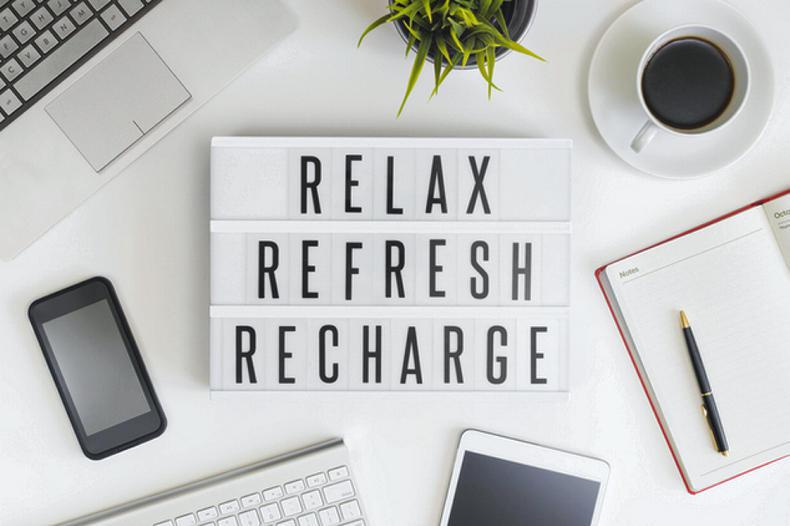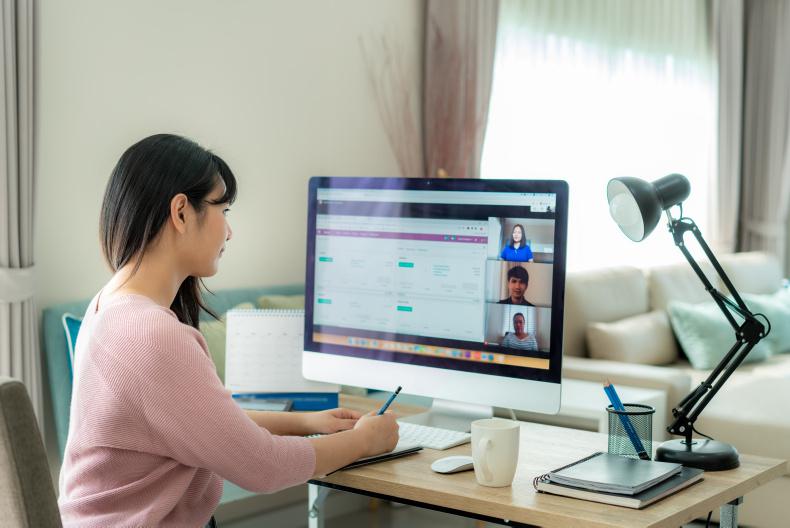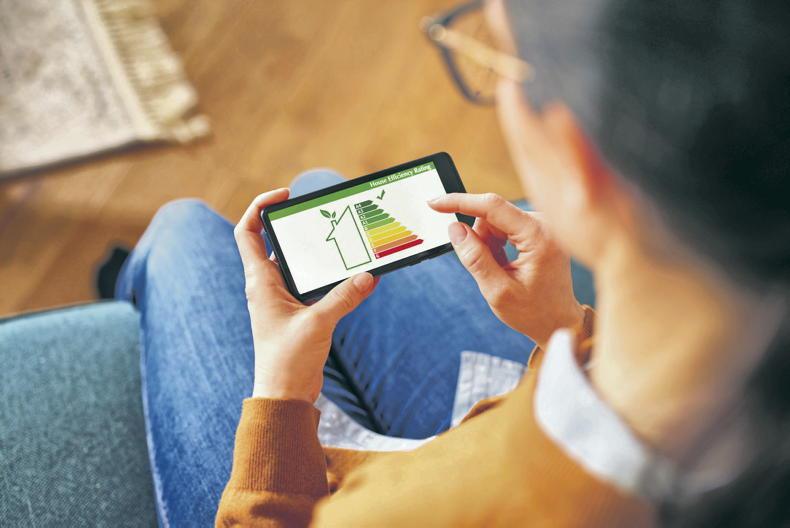1 Prioritise your own
self-care
Juggling computer work, home and farm life together can and will be stressful. Our own self-care needs are often lost due to conflicting responsibilities, meaning that we could get to the end of the workday and realise we are both frustrated and exhausted.
Start your day by writing a short list of your key self-care needs. These could include taking regular breaks during your computer work, getting into nature, stretching, having a refreshing shower, listening to a podcast, painting or having a video call with a friend. Consciously try every day to incorporate these needs into your schedule.
Top tip: Try to set a minimum time limit for these activities. I like to pre-plan my minimum work breaks of 20 minutes away from my desk and ensure I take them by building them into my work calendar and sharing that online calendar with my teammates.

2 Breakdown work tasks to your advantage
Spend a few minutes before you start work identifying and breaking down the actual tasks you need to do that day.
The Eisenhower Method helps us to organise and prioritise tasks, but you can develop this further and arrange tasks on your to-do-list into ones that take shorter and longer time to complete.
Top tip: Group tasks of a similar nature together. For example, answer emails at the start and the end of the day or work period. Concentrated work ideally needs a minimum period of focus. In my case, I normally write or develop learning content for the courses I run early in the morning, when I am at my sharpest. Think about what works for you.
Control as much of your environment as you can, so you can give the work you are doing your best focus. Remember to customise the technology tools you use to your advantage.
Turn off notifications on your desktop and phone. Apply the use of do not disturb messages and if required, make use of out-of-office automatic replies on emails. This can help manage the expectations of your teammates.
Top tip: Take notice of what helps you concentrate and complete a work task. Think about whether you need background noise or if you can concentrate better away from a screen. Perhaps you prefer to use a notebook and pen over typing on the computer, or you are more productive after you have completed some jobs on the farm. Once you notice what can foster concentration, do more of it.
4 calendar management and blocking
Time management is essential when working from home. When done effectively, it can lead to productivity and ease stress.
It takes perseverance, practice and discipline to be strict in controlling your calendar. It’s important to keep your calendar up to date, while also blocking out times for work that takes concentration.
Include comfort breaks and self-care slots into your work calendar, to ensure they are time-tabled and taken.
Top tip: Online calendars have various functionalities and options that are worth exploiting. My favourites include using colours in your calendar blocking, setting up reminders, sharing calendars with teammates so they can see your availability and utilising shorter meeting booking slots of 30 and 15 minutes, where possible.
When we take away the commute to work, we lose the warm-up and wind-down from work, which means we don’t have the time to adjust between the two “places”. It’s important to notice what helps you move between your job, the farm and your home. Perhaps a walk before work helps you start your day with a clear mind, or a shower helps when you finish work – more or less washing off the workday.
Top tip: Even though we are working from home, trick your brain into work mode by taking off those pyjamas and dressing for work. The simple routine of changing clothes or shoes can help kick-start your brain for work.

Rowena Hennigan co-authored the special-purpose level-six Remote Working Certification course for HSE workers working from home during the lockdown. For more visit: rowenahennigan.com Read more
Working from home – adjusting mentally to your new normal
Working from home focus: Kathleen McNally, Co Mayo
1 Prioritise your own
self-care
Juggling computer work, home and farm life together can and will be stressful. Our own self-care needs are often lost due to conflicting responsibilities, meaning that we could get to the end of the workday and realise we are both frustrated and exhausted.
Start your day by writing a short list of your key self-care needs. These could include taking regular breaks during your computer work, getting into nature, stretching, having a refreshing shower, listening to a podcast, painting or having a video call with a friend. Consciously try every day to incorporate these needs into your schedule.
Top tip: Try to set a minimum time limit for these activities. I like to pre-plan my minimum work breaks of 20 minutes away from my desk and ensure I take them by building them into my work calendar and sharing that online calendar with my teammates.

2 Breakdown work tasks to your advantage
Spend a few minutes before you start work identifying and breaking down the actual tasks you need to do that day.
The Eisenhower Method helps us to organise and prioritise tasks, but you can develop this further and arrange tasks on your to-do-list into ones that take shorter and longer time to complete.
Top tip: Group tasks of a similar nature together. For example, answer emails at the start and the end of the day or work period. Concentrated work ideally needs a minimum period of focus. In my case, I normally write or develop learning content for the courses I run early in the morning, when I am at my sharpest. Think about what works for you.
Control as much of your environment as you can, so you can give the work you are doing your best focus. Remember to customise the technology tools you use to your advantage.
Turn off notifications on your desktop and phone. Apply the use of do not disturb messages and if required, make use of out-of-office automatic replies on emails. This can help manage the expectations of your teammates.
Top tip: Take notice of what helps you concentrate and complete a work task. Think about whether you need background noise or if you can concentrate better away from a screen. Perhaps you prefer to use a notebook and pen over typing on the computer, or you are more productive after you have completed some jobs on the farm. Once you notice what can foster concentration, do more of it.
4 calendar management and blocking
Time management is essential when working from home. When done effectively, it can lead to productivity and ease stress.
It takes perseverance, practice and discipline to be strict in controlling your calendar. It’s important to keep your calendar up to date, while also blocking out times for work that takes concentration.
Include comfort breaks and self-care slots into your work calendar, to ensure they are time-tabled and taken.
Top tip: Online calendars have various functionalities and options that are worth exploiting. My favourites include using colours in your calendar blocking, setting up reminders, sharing calendars with teammates so they can see your availability and utilising shorter meeting booking slots of 30 and 15 minutes, where possible.
When we take away the commute to work, we lose the warm-up and wind-down from work, which means we don’t have the time to adjust between the two “places”. It’s important to notice what helps you move between your job, the farm and your home. Perhaps a walk before work helps you start your day with a clear mind, or a shower helps when you finish work – more or less washing off the workday.
Top tip: Even though we are working from home, trick your brain into work mode by taking off those pyjamas and dressing for work. The simple routine of changing clothes or shoes can help kick-start your brain for work.

Rowena Hennigan co-authored the special-purpose level-six Remote Working Certification course for HSE workers working from home during the lockdown. For more visit: rowenahennigan.com Read more
Working from home – adjusting mentally to your new normal
Working from home focus: Kathleen McNally, Co Mayo











SHARING OPTIONS